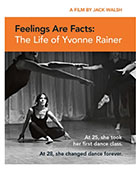
Feelings are Facts: The Life of Yvonne Rainer 2016
Distributed by Jack Walsh
Produced by Christine Murray
Directed by Jack Walsh
DVD , color with b&w, 82 min.
High School - General Adult
Art, Choreography, Dance, Feminism, Gender Identity, Performance Art
Date Entered: 08/09/2016
Reviewed by Rebecca Adler Schiff, College of Staten Island, City University of New YorkFeelings are Facts: The Life of Yvonne Rainer – the title echoes Rainer’s 2006 memoir – paints a sympathetic comprehensive portrait of one of the most original, influential artists of the twentieth century American avant-garde. Dancer, choreographer, filmmaker, feminist polemicist, Rainer has created work of enduring significance to every field she set her fearless imaginative faculties on. Her career has spanned more than five decades, and continues to this day. Her genius for finding an artistic path where there appeared to be none was first seen in the late 1950s, in dance. Finding her own body unsuited trying to emulate acceptable dance steps, Rainer broke with the past and introduced a radical new lexicon of everyday gestures and pedestrian movements that forever changed the nature of the art. Influencing her in her quest were the avant-garde choreography of Merce Cunningham and the music of John Cage. Rainer eventually became a founding member of the renowned Judson Dance Theater in Greenwich Village, where she worked for many productive years as both performer and choreographer. The Judson venue also provided a fertile artistic environment in which actors, dancers, musicians, painters, and writers were able to work together on a number of notable collaborative projects. Eventually, though, Rainer, with her fierce sense of social justice, was drawn to the political and artistic possibilities within film. Over the next two decades, she made a number of experimental films that explored social issues such as feminism, sexuality, relationships, political violence, privilege, power, and breast cancer (which she overcame). But the passion for dance never left her. In 2000, age sixty-six, Rainer is commissioned by the legendary Russian dancer Mikhail Baryshnikov to choreograph a work for his White Oak project, After Many a Summer Dies the Swan. The Baryshnikov benediction recruits Rainer into the ranks of the most important dancers of her time. Interwoven with a selection of Rainer’s dances and films in Jack Walsh’s generously paced documentary is commentary provided by Rainer herself as well as from cultural critics, artists, and dancers, who offer insightful reflections on Rainer’s creative process and the intellectual movements in which this most remarkable artist partook. Evident also in Rainer’s own appearances is a warm, modest, independent, courageous human being with a subtle, winning sense of humor. The film comes with a second disc containing additional interviews and a complete performance of Spiraling Down.